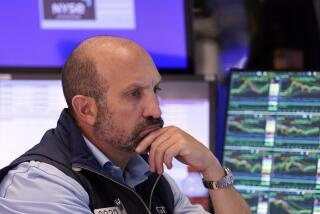U.S. Stocks Depressed by Global Woes
- Share via
Worries that emerging-market woes would deteriorate into a global economic and financial crisis sent Wall Street stocks into a tailspin Friday, while sparking a bond rally that sent long-term interest rates to record lows.
The demand for U.S. assets lifted the dollar’s value relative to the Japanese yen, but concerns about global growth depressed commodity prices further.
The Dow Jones industrial average ended down 77.76 points, or 0.9%, at 8,533.65, more than 200 points above a session-low 8,328, as bargain hunters emerged late in the session.
The Dow’s recovery allowed the blue-chip average to post a weekly gain of 108.65 points, its first weekly advance since reaching a record high of 9,337.97 on Friday, July 17.
But in the broader market Friday, declining issues outpaced advancers by a margin of 2,303 to 800 on heavy New York Stock Exchange volume of 725.79 million shares.
The Russell 2,000 index of smaller stocks slumped 1.5% to 395.64, after falling to a new 1998 low of 390.00.
For many investors, the only thing that seemed worth buying Friday was Treasury bonds, as the “flight to safety” continued.
Around midday, the benchmark 30-year Treasury bond price was up two full points, pushing its yield down to 5.38%--the lowest yield since regular issuance of 30-year bonds began in 1977.
The bond market then sold off somewhat, lifting the yield to 5.44% at the close, still a record closing low and off from 5.51% on Thursday.
“There’s catastrophe in the air, and people run to the safest thing they know,” said William Gross, who oversees about $137 billion in bonds at Pacific Investment Management Co. in Newport Beach.
For the week, the yield on five-year T-notes dropped from 5.34% to 5.21%.
From three-month T-bills to 30-year T-bonds, all Treasury yields now are below the Fed’s benchmark short-term interest rate, the federal funds rate, which is 5.5%.
“It’s a signal of deflationary pressure,” said Brian Wesbury, chief economist at Griffin, Kubik, Stephens & Thompson in Chicago. “The Fed has gone too far in focusing on future inflation rising.”
He expects the Fed to lower interest rates before the end of the year.
Others, however, said yields have fallen too low, assuming the U.S. economy isn’t headed for recession.
“These levels are unsustainable,” said Kevin McClintock, head of taxable fixed-income at Dreyfus Corp., which manages more than $90 billion in assets. He sold five-year T-notes and 30-year bonds on Friday.
“It’s time to sell bonds, and the only risk is that you are a day or two early,” he said.
Yet analysts noted that world markets still are dogged by problems in a growing number of economies, from Russia to Venezuela.
Venezuelan shares plunged 8.4% on Friday on currency devaluation rumors. Mexican stocks lost 2.4%, and Brazil’s market fell 2.9%.
In Europe the German market plunged 5.9% Friday on worries about Russia’s economic crisis, in the wake of Moscow’s decision to devalue the ruble this week. The French market slumped 3.5%.
Earlier Friday, Asian markets also had declined, with Hong Kong down 2.8% and Malaysia down 7.7%. Those beleaguered markets had rallied earlier in the week.
For the U.S. stock market, despite Friday’s turnaround, “this market is ill-equipped to handle turmoil and uncertainty, and we’ve got more than a handful of that with the international issues we’re facing,” said Greg Nie, technical analyst at Everen Securities.
What’s more, President Clinton’s decision to bomb suspected Mideast and African terrorist sites this week may lead to retaliation by those groups, analysts warned.
Meanwhile, Clinton is facing a leadership crisis of his own, as the Monica Lewinsky case refuses to die down.
One of the weakest stock sectors Friday was the banking sector.
“They went after banks from the get-go this morning,” Lawrence Cohn, an analyst at Ryan, Beck & Co., said. “The psychological atmosphere is horrible, between concern about Russia and Japan and now concerns about Latin America.”
Citicorp slid $4.75 to $134.31, and Chase Manhattan lost $1.69 to $63.69.
However, as Cohn and several other analysts pointed out, the declines at their steepest seemed to outstrip the business outlooks for the banks and other market sectors.
In commodities, where prices have been hitting five- to 10-year lows lately, corn on Friday fell to a six-year low, and hogs slumped to the lowest price since 1994.
The Commodity Research Bureau index fell 2.54 points to 200.54, the lowest since February 1993.
Plunging global financial markets renewed concern that other countries won’t have money to buy U.S. farm products.
Oil prices also retreated again.
(BEGIN TEXT OF INFOBOX / INFOGRAPHIC)
Investors: Searching for Safe Haven
Russia’s currency devaluation this week, rumors Friday of a Venezuelan devaluation and the U.S. attacks on suspected terrorist sites on Thursday all helped spur wild trading in global markets on Friday. The bottom line: Investors are shunning risk, and seeking safety.
Mexico’s Peso Is Clobbered . . .
The peso hit a record low Friday, as investors fled Mexico. Pesos per dollar, weekly closes:Friday 9.68
. . . While Money Pours Into U.S. Treasury Bonds
The yield on the 30-year Treasury bond sank to a new low Friday, as investors bid bond prices higher. Weekly closes: Friday 5.44%
. . . And The Dow Rides a Roller-Coaster
Friday trading in the Dow industrials, on the half-hour:
At all Times (EDT)
Low for day, 8.328.20
Close: 8,533.65, --77.76
* Source: Bloomberg News
More to Read
Inside the business of entertainment
The Wide Shot brings you news, analysis and insights on everything from streaming wars to production — and what it all means for the future.
You may occasionally receive promotional content from the Los Angeles Times.










